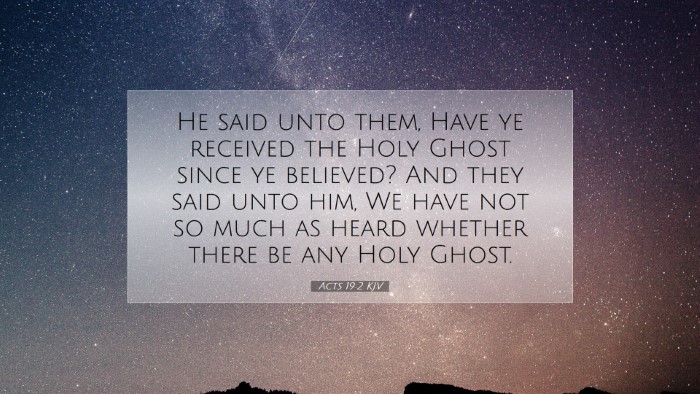Commentary on Acts 19:2
Acts 19:2 states, "Did you receive the Holy Spirit when you believed?" They answered, "No, we have not even heard that there is a Holy Spirit."
This verse occurs during Paul’s visit to Ephesus, where he encounters a group of disciples who had received John's baptism but were unaware of the Holy Spirit's coming and significance. The commentary on this passage is vital for understanding the nature of Christian initiation and the role of the Holy Spirit in the early Church.
Contextual Overview
According to Matthew Henry, the context serves as a significant reminder of the continuity of God's work from the Old Testament through the New Testament. John the Baptist’s message of repentance was preparatory, leading to the fuller revelation of Christ and the outpouring of the Holy Spirit.
Albert Barnes notes that these disciples were likely followers of John the Baptist, adhering to his teachings without the complete understanding provided by the fulfillment in Jesus Christ. This gap in knowledge presents an interesting case for the necessity of continued revelation and teaching within the community of faith.
The Question of Receiving the Holy Spirit
Paul’s inquiry about the reception of the Holy Spirit raises fundamental questions regarding the nature of belief and subsequent experiences of grace. Adam Clarke elaborates on the differing dimensions of belief; one may believe in the message of Christ but still lack a full understanding of the implications of his work, particularly concerning the Holy Spirit’s role.
This presents a paradigm that can be explored in contemporary pastoral practice. There may be members within the church who have a faith foundation but are not fully aware of the transformative power of the Holy Spirit in their Christian life.
The Disciples' Response
The response of these disciples, "No, we have not even heard that there is a Holy Spirit,” indicates a significant deficiency in their theological framework. Matthew Henry discusses this as a caution against the potential for spiritual ignorance among believers.
It calls attention to the necessity for informed discipleship. Churches should prioritize teaching on the Holy Spirit to ensure members are equipped for the Christian journey. Albert Barnes further emphasizes that this ignorance was not merely naive but indicative of the ongoing revelation of God’s work in history.
Theological Implications
The theological implications of this verse are profound. Acts 19:2 challenges assumptions about belief and the inception of the Christian life. The presence of the Holy Spirit is integral to the believer’s identity. In the early Church, the reception of the Spirit was often manifested as an outward sign of an inward change.
Albert Barnes points out that the absence of the Holy Spirit among believers was a significant concern, suggesting that there was an incomplete understanding of Jesus's promise. This concerns all who profess faith in Christ, indicating that one’s spiritual experience must be rooted in a relationship with the Holy Spirit.
Applications for Pastoral Ministry
For modern pastors and theologians, Acts 19:2 opens a dialogue on the importance of teaching about the Holy Spirit. As Adam Clarke remarks, the lack of engagement with the Holy Spirit can lead to a superficial faith. Pastoral efforts should therefore include a robust teaching on the triune nature of God and the empowerment of believers through the Spirit.
- Encourage Spiritual Formation: Designs of programs that integrate teachings on the Holy Spirit can encourage deeper spiritual formation among congregants.
- Engage with the Community: Facilitate discussions and gatherings for believers to share experiences of the Holy Spirit in their lives.
- Promote Biblical Literacy: Implement initiatives aimed at increasing biblical literacy, focusing on the holistic context of Scripture, including the Acts of the Apostles.
Conclusion
Acts 19:2 functions as a pivotal moment in the transition from the Old Covenant to the New Covenant, urging believers to move past initial repentance towards a vibrant relationship enveloped by the Holy Spirit. Through insights from Matthew Henry, Albert Barnes, and Adam Clarke, we gain a deeper understanding of this passage’s theological depth and its implications for faith today.
Ultimately, this verse encourages both individuals and churches to seek a fuller experience and understanding of the Holy Spirit's work, ensuring that faith is deep-rooted in personal and communal revelatory knowledge, enabling believers to live transformed lives for Christ.


